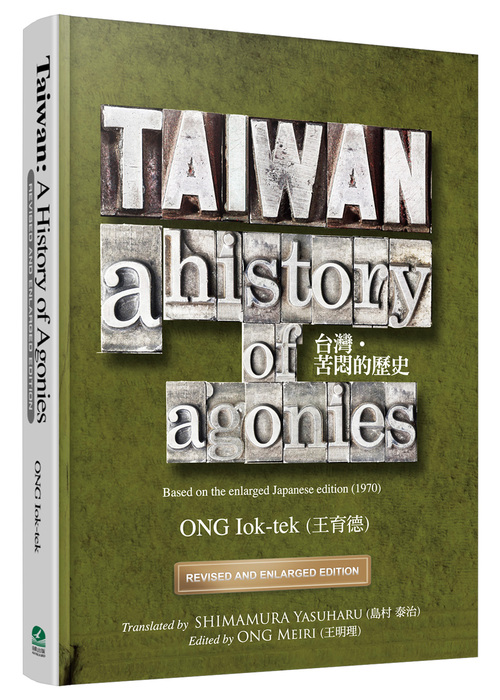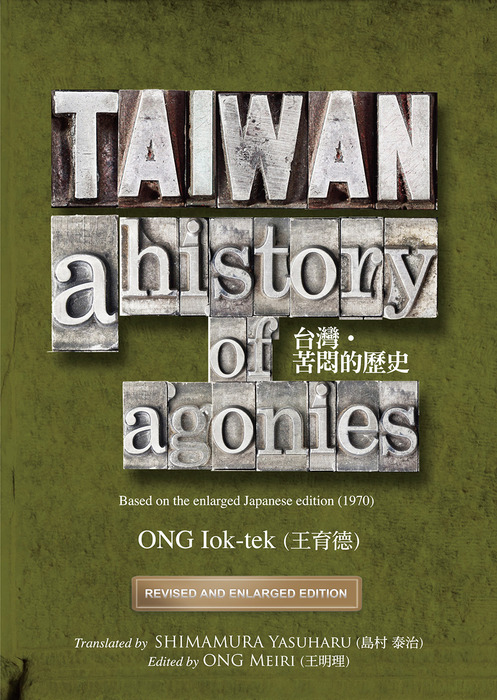Author
Ong Iok-tek (1924-1985)
PhD in Literature (Tokyo University)
Professor of Meiji University, Department of Commerce
Instructor in many Universities, e.g. Tokyo University of Foreign Studies
Founder of Taiwan Youth (forerunner of WUFI)
Secretary-General of Council for Implementing Compensation for Ex-Japanese Soldiers of Taiwanese Ancestry
1924 Born in Tainan, Taiwan
1942 Graduated from Taihoku High School
1943 Entered Tokyo Imperial University, Faculty of Literature, Department of Chinese Philosophy/Literature (支那哲文学)
1944 Evacuated to Taiwan, served in City Office, Chia-yi
1945 Theatrical activities while teaching at Tainan First High School
1947 January, Got married
February, 228 Incident; his elder brother Ong Iok-lim who was a prosecutor was killed by KMT government
1949 Took refuge in Japan
1950 Re-entered Tokyo University
1960 Completed graduate studies at Post-Graduate School, Tokyo University
Founded Taiwan Youth (台湾青年社), inaugurated its monthly organ Taiwan Youth (《台湾青年》); devoted much of his time to Taiwan independence movement since then
1975 Founded Council for Implementing Compensation for Ex-Japanese Soldiers of Taiwanese Ancestry; appointed Secretary-General of the council and actively worked toward resolving this problem
1985 September 9, Deceased of myocardial infarction
2021 September 9, Ong Iok-tek Memorial Museum founded in Tainan City
Publications:
Taiwanese Common Vocabulary (Tokyo, Eiwagogaku-sha, 1957)
Taiwan: A History of Agonies (Tokyo, Kobundo, 1964)
First Step to Taiwanese (Tokyo, Furinshobo, 1972)
Elementary Taiwanese (Tokyo, Nichu-shuppan, 1983)
Taiwan Strait (Tokyo, Nichu-shuppann, 1983)
A Historical Study of Taiwanese (Tokyo, Daiichi-shobo, 1987)
The Complete Works of Ong Iok-tek (in 15 volumes)
A Taiwanese Youth Who Lived Showa (Tokyo, Soshisha, 2011)
Ong Iok-tek’s Seminar of Taiwanese (Tokyo, Toho-shotenn)
And numerous theses on Taiwan problem, linguistics and more.
Editor
Ong Meiri
Chairwoman of World United Formosans for Independence (WUFI) Japan
Director of the Friends of Lee Teng-Hui Association in Japan
Member of the Japan Poets Club
1954 Born in Tokyo
1977 Graduated from Keio University, Faculty of Literature, Department of English/American Literature
1985~ Engaged in cataloging and publication of manuscripts of father, Ong Iok-tek, after his departure in 1985
2011~ Chairwoman, WUFI Japan
Publications:
・Collections of Poems:
Hikidashiga Ippai (Drawers Full of XXXX) (Tokyo, Soshisha, 2003)
Sunflowers in Homeland (Taiwan, Yu Shan-she, 2015)
・Editing:
The Complete Works of Ong Iok-tek (15 volumes) (Taipei, Ch’ien Wei-ch’u-pan, 2002)
A Taiwanese Youth Who Lived Showa (Tokyo, Soshisha, 2011)
・Translation:
Rethinking “One China” edited by John J. Tkacik, Jr. (Tokyo, Soshisha, 2005)
Translator
Shimamura Yasuharu
1935 Born in Tokyo
Education:
1953 Graduated from Saitama Prefectural Urawa High School
1955 Boise Junior College (latter-day Boise State University), Boise, Idaho, U.S.A. (English, music) A.A.
1957 University of Utah, Salt Lake City, Utah, U.S.A. (English, music) B.M.
1960 Los Angeles Conservatory of Music, L.A., California
Profession:
1953-55 Lecturer, Kano Junior High School (alma mater), English and History
1965 Japan Cultural Forum, Japanese leg of the Congress for Cultural Freedom, Paris, and de facto publisher of its Japanese-language organ Jiyu (Freedom)
1972 Royal Norwegian Embassy, chancellor/senior translator
Field of Work:
Apart from creative endeavor in music, engaged exclusively in bilingual translation on all subjects over two decades of foreign service.
Now at the age of Umbrella, or having attained eighty years of age, fully retired into a country life with abundant time for meditation and writing—and for occasional welcome commissions such as Taiwan: A History of Agonies.
目錄
Preface / Ng Chiau-tong (黃昭堂)
Preface / Ong Meiri (王明理)
Some Remarks on Changes in Ong Iok-tek’s Recognition of Indigenous People of Taiwan / Kondo Aya (近藤綾)
Explanatory Note
Preliminary Remarks
Introduction A Stormy Situation Facing Taiwan
Chapter 1 A LAND OF FATEFUL PAST—In search of a new world
1. Taiwan: How it was so named
2. Of Pirate Families
3. Hardships: It all began in the Penghu Islands
4. Japan’s Ambition
5. The Tragedy of Indigenes
Chapter 2 A NEW WORLD YET INCOMPLETE—Dutch period (1624-1661)
1. Dutch Rule
2. Footsteps of the Spaniards up North
3. Transit Trade Boomed
4. The Indigenes under Control
5. The Early Honeymoon Period
6. Taiwanese Society under Dutch Rule
7. Kuo Huai-i’s Rebellion
Chapter 3 KOXINGA: HIS BRIGHT AND DARK SIDES—Cheng period (1661-1683)
1. The Cheng: A prototype of the Kuomintang regime
2. Flight to Taiwan
3. The Cheng: Its nature
4. The Cheng: Its inner conflict
5. Resistance or Truce?
6. The Harshest Demand Ever
Chapter 4 A PILE OF BLOOD AND SWEAT—Qing period (1683-1895)
1. “Isolate Dangerous Elements”
2. Heading for Taiwan in Droves
3. The Life of the Pioneers
4. Corrupt and Incompetent Officials of the Qing Court
5. “Minor Rebellion Every Three Years,Major Rebellion Every 5 Years”
6. “Factionalism and Feuding”
7. Fu-chien’s Colony
8. Land and People beyond Qing’s Rule
9. The Taiwan Strait—History’s Watershed
Chapter 5 NO ONE BUT TAIWANESE—Republic of Formosa (1895)
1. Forsaken Before You Knew
2. The Nature of the Republic of Formosa
3. Qing’s Soldiers and Taiwanese
Chapter 6 IN THE VORTEX OF MODERNIZATION—The Japan colonial period (1895-1945)
1. What Did the Japanese Inherit
2. Successful Colonial Rule
3. Some Comparisons: Vertical and horizontal
4. Hopeless Armed Resistance
5. A Thorough Carrot-and-Stick Policy
6. Chien Ta-shih and Ch’en Ch’iu-chu
7. A Superstitious “Conspiracy”
8. Lin Hsien-t’ang and Overseas Students
9. Ideals and Realities of the Culture Society
10. “What’s Wrong about Becoming a Japanese?”
11. Division in Prosperity
12. Taiwan Communist Party and its Counterparts in Japan and China
13. Criticisms and Evaluations of the Two Japanese Scholars
14. Agonizing while Transfiguring
Chapter 7 ALL-OUT CONFRONTATION WITH THE CHINESE—Kuomintang period (1945-1963)
1. Dogs Gone; Pigs Come
2. The Great 2.28 Rebellion
3. The League for Re-liberation of Taiwan in Hong Kong
4. Fleeing to Taiwan
5. Great Oppression and Wu Kuo-chen’s Downfall
6. A Refugee Regime; A House of Contradictions
7. Land Reform in Disguise
8. The Trick of “Counterattack”
9. An Ugly Face behind the Mask
10. Ultimate Struggle
11. Lei Chen and Opposition Party Movement
12. Overseas Independence Movements
13. Between the United States and the Kuomintang Regime
14. Between Chinese Communists and the Kuomintang
Chapter 8 FROM 1960’s to 1970’s—1964~
1. Harassed from Within and Without
2. The Vietnam War and the Cultural Revolution
3. The Advance of Japanese Capital in Taiwan
4. Chiang Ching-kuo and the P’eng Ming-min Incident
Concluding Chapter Taiwan’s Independence
THE HISTORY OF TAIWAN SINCE 1970 ONWARD / Ong Meiri
TRANSLATOR’S NOTE / SHIMAMURA Yasuharu
CHRONOLOGY
INDEX


